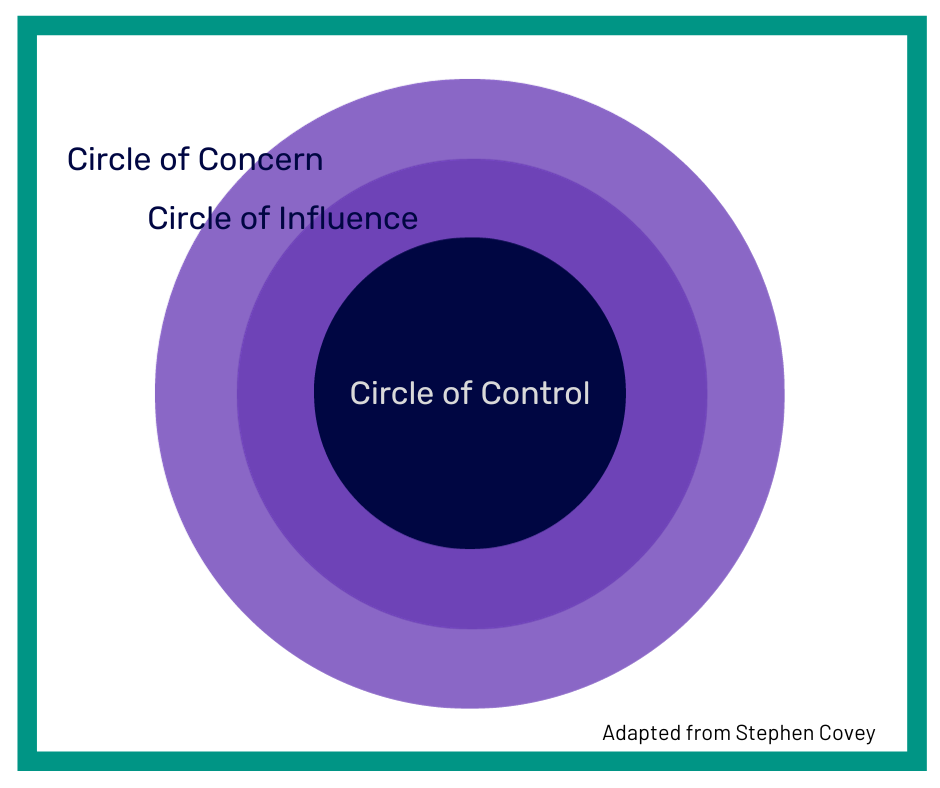Many of us have experienced stress or stressful situations at some point in our lives. Life is really testing, and pressures are everywhere, sometimes pushing us too far, controlling how we feel about ourselves and bringing out the very worst in us.
There are many self-help books and podcasts available on the market to help you deal with stress, but a really simple tool I use often with clients is the Circle of Control and Influence in Stephen Covey’s book, The 7 Habits of Highly Effective People.
Covey identifies two different types of people. Proactive people are those who really focus on what they can do and what they can influence. Reactive people are the opposite – they are the people who focus all of their energy on the things they simply cannot control.
Those people have an attitude of blame and are ‘victims’. Proactive people are able to make decisions, have more energy and generally live happier and more fulfilling lives. Because they dwell on things they cannot control, Reactive people are at risk of being negative and critical in nature – often missing out on much greater opportunities.
How do you know if you are proactive or reactive?
Let’s look at the circle of control and influence.
Write down all the things you’re concerned about and filter down to the things you can influence and those you can control. If you truly understand what is in your control, you are a proactive person. If not, tighten your personal circle and identify the ‘micro’ concerns that you can control.
The key purpose of this circle is to focus your thinking on what it is that you’re concerned about, how much of it you can influence and how much you can actually control. We can then start to shift the mindset of worrying about things and taking action to deal with them.

Let’s take Brexit as a recent and relevant ‘macro’ example. Regardless of your feelings about it, it does spark a bit concern for everyone because of the uncertainties and implications, political, societal and economic.
People who voted to remain are concerned that their living standards and business prospects will be impacted. Those who voted to leave have concerns about the democracy of the decision and that the result of their vote will be delivered.
Regardless of the way you voted, it’s a concern at the moment. Is it something that is in your direct control? Not really. That’s in the hand of governments and policy makers. Is it something we can influence? To a point it is. We can lobby our MPs and put our case forward but ultimately the decision was made when the UK voted.
What can we control about Brexit? Well, we can control our response to it and prepare our businesses and lives for the adjustment.
It largely comes down to understanding what is in your gift to control, what you are able to seek support with and what you are in direct control of.
Are you in control of the environmental impacts of climate change? Probably not. Are you able to influence this? Absolutely! You can make changes to the way you live your life, putting you in control of making decisions that will benefit the environment.
You’re worried about going to work because your boss is a bully. You can’t control them, but you can control how you approach the situation. You can confront the situation, you can take action to address their behaviour, you can move to a new role in a new company or you can pursue that long held ambition of doing your own thing.
Focus on your behaviour.
Many of my ‘go to’ strategies are ‘cognitive behaviour’ in that they require a degree of self-awareness and ability to objectively consider what is a controllable concern and what isn’t.
Find healthy stress relievers. Obviously, most of us like a drink if we have had a tough week or some rubbish news from a client but release that stress by doing meditation, yoga, reading or something that takes the negative energy away from your body for a while and rests your mind. Healthy, positive mantras are a great start.
Instead of worrying, think of a positively way to position the concern. Instead of “I hope it doesn’t rain on Saturday” change your approach to “If it is raining on Saturday, I will take an umbrella and deal with it”. Allow yourself to be open to the worse case scenario but just plan for dealing with it constructively.
Develop positive affirmations. You might be really disorganised but an amazing people person. Bring out the people person and keep reminding yourself of what you’re great at.
Unfortunately, the need to accept the unpredictability of life, and of other people is an inevitability and necessary. Life is messy and disorganised. Like my column says, you can organise the best party in town but unfortunately you can’t make people have fun so just find a way of dancing to your own tune.
